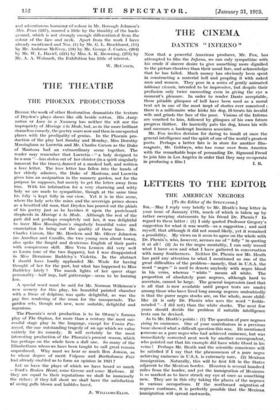THE THEATRE
THE PHOENIX PRODUCTIONS
BESIDE the work of other Restoration dramatists the texture of Dryden's plays shows like silk beside cotton. His Assig- nation or Love in a Nunnery has neither the wit nor the impropriety of Mariage a la Mode, but, as in the more brilliant shameless comedy, the poetry soars now and then in unexpected places with the prodigality of genius. In the Phoenix pro- duction of the play last Sunday and Monday, Miss Dorothy Massingham as Lucretia and Mr. Charles Carson as the Duke of Mantoua had an extraordinary scene together. The reader may remember that Lucretia—" a lady designed to be a nun "—has stolen out of her cloister (in a spirit singularly innocent for the times), danced at a masked ball, and written a love letter. The love letter has fallen into the hands of her elderly admirer, the Duke of Mantoua, and Lucretia gives him an assignation in the nunnery garden, not for the purpose he supposes, but merely to get the letter away from him. With his infatuation for a very charming and witty lady we are made to sympathize, though at the same time his folly is kept fully in our view. Yet it is in this scene, where the lady acts the minx and the sovereign prince shows as a besotted old man, that Dryden has poured out the phials of his poetry just as he lavishes it upon the pasteboard shepherds in Mariage is la Mode. Although the rest of the part did not perhaps completely suit her, it was delightful to have Miss Massingham's singularly beautiful voice and enunciation to bring out the quality of these lines. Mr. Charles Carson, like Mr. Hordern and Mr. Oliver Johnston (as Aurelian and Camillo, the two young men about town), also spoke the limpid and dexterous English of their parts with conspicuous skill. Miss Vera Lennox did very well as Laura (one of the two flappers), but I was disappointed in Miss Hermione Baddeley's Violetta. In the abstract I should have loudly applauded Mr. Wade for having thought of her for the part, but what has happened to Miss Baddeley lately ? The marsh lights of her queer stage personality—half imp, half guttersnipe—seem to be burning low.
A special word must be said for Mr. Norman Wilkinson's new scenery for this play, his beautiful painted chamber with a frieze of dolphins was quite delightful, as was the gay free rendering of the room for the masquerade. The garden sets, though not new, were suitable, delightful and ingenious.
The Phoenix's next production is to be Otway's famous play of The Orphan, for more than a century the most suc- cessful stage play in the language, except for Venice Pre- served, the one outstanding tragedy of an age which we value entirely for its comedy. It will certainly be the most interesting production of the Phoenix's present season, which has perhaps on the whole been a dull one. So many of the Elizabethans whom we have been taught to call great remain unproduced. Why must we hear so much Ben Jonson, as to whose degree of merit Volpone and Bartholomew Fair had already enabled us to form an opinion in 1921 ?
Let us have the plays of which we have heard so much --Ford's Broken Heart, some Greene and some Marlowe. If they are equal to their reputations we shall be immensely the richer ; if they fall short we shall have the satisfaction of seeing gaffs blown and bubbles burst.
A. WILLIAMS-ELLIS.














































 Previous page
Previous page